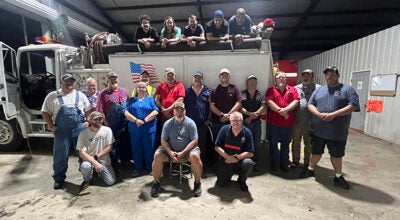Co-Lin student on the right track
Published 8:15 pm Saturday, March 11, 2017

- Photo by Donna Campbell/The MIBEST program has paid off for Candace Greene, a full-time mother and college student. Greene also works at Copiah-Lincoln Community College between classes. Pictured are, from left: Hannah, Halle, Greene, Cobren and Kailey.
It took four kids and a divorce to get an East Lincoln woman on the right track.
Barely out of her teens, Candace Greene was a newlywed with two babies and a husband, but no high school diploma. Now she’s a single mom raising a quartet while taking a full course load at Copiah-Lincoln Community College and working in the college’s Foundation office. Her goal is an accounting degree.
Greene, 32, gives credit for her success to the MIBEST program and her own determination.
The Mississippi Integrated Basic Education and Skills Training program combines high school equivalency preparation, for-credit skills training, and industry-based credentials with intensive support in a concurrent program that accelerates credential attainment and employment in middle skill occupations in manufacturing, health care, information technology and other in-demand career areas.
Mississippi is now one of 18 states in the nation to have this type of program, which is offered to students at no cost or minimum cost. MIBEST is a proven model for taking an individual who is dependent upon public assistance to an employed worker contributing to Mississippi’s tax base.
“MIBEST helps transform high school drop-outs into skilled and productive workers who can better care for their families and contribute to our state’s economy,” said Mr. Kenneth Wheatley, MIBEST program director for the Mississippi Community College Board.
The state’s economy rises and falls on its ability to put people to work in jobs that pay family-sustaining wages. Yet, one in five working-age (25-65 years old) adults in the state is a high school dropout. The unemployment rate for recent high school dropouts hovers at 30 percent and most certainly contributes to Mississippi’s low workforce participation rate of 57 percent, the second lowest in the nation. Mississippi dropouts who do enter the workforce are typically destined to low skill, low wage jobs that offer little financial security.
That was Greene’s story.
She attended a private school in Jackson until her parents moved to McComb when she was about 14. She attended a Christian school in Jayess for a year then turned to homeschool classes so she could help take care of her father longterm after a back injury. She finished the work but it wasn’t an accredited program in Mississippi.
She was 18 when she had Hannah in 2003, and married Hannah’s dad when she was 20, just 10 days before Cobren was born. Hannah was born at 30 weeks, Cobren at 25 weeks. Doctors diagnosed Greene’s son with several physical and mental disabilities. The couple moved to East Lincoln in 2006 and Kailey came along the next year. Halle was born in 2010. The couple’s divorce was finalized in 2011.
Greene turned to waitressing to take care of her brood. She served up seafood and hushpuppies for five years at The Fish Fry and a year at Poppa’s Fish House. She also cleaned houses for people. “I had to have two jobs to make it,” she said.
She wanted to go back to school. “It just seemed like it was impossible,” she said.
She called Copiah-Lincoln to ask about their GED program. “I knew that I needed a change,” she said. “My job and what I was making, I needed more. I knew there was more in life and more that I wanted to do that I couldn’t do without the education.”
When her youngest entered kindergarten, Greene decided to take GED classes. She dragged her four kids to the college for three nights to take the entrance exams for the program. “The ladies there helped me watch my kids while I tested in,” she said.
At the end of eight weeks, she was ready to take her math test. She did so well, her teacher gave her a voucher for the next eight weeks of the program. But she didn’t return. “I had a fear that I couldn’t do this,” she said.
Then Co-Lin sent her a letter about the MIBEST program. It’s unique because students are eligible to complete a high school equivalency diploma while earning college credit toward a technical certificate or an associate in applied science degree at Co-Lin, said Susie J. Patrick, college navigator in Career, Technical and Workforce Education at Co-Lin.
“MIBEST at Co-Lin students are real college students, with real college opportunities and expectations,” Patrick said. “Students take dual credit courses at Copiah-Lincoln Community College and earn their high school equivalency diploma and college credits at the same time.
“MIBEST at Co-Lin classes will be a combination of Adult Basic Education classes and Career Tech Program classes.”
Greene was accepted into the program last summer and obtained her GED certificate. She then enrolled in two of Co-Lin’s business office technology classes.
“It was kind of scary. I was scared,” she said. “I was a little nervous, questioning myself.”
Then she earned her diploma. “That’s something I worked really hard for. It boosted my confidence,” she said.
She also got a job assisting the secretary in Co-Lin’s Foundation office.
MIBEST offers five career pathways: automotive technology, diesel equipment technology, heating and air conditioning technology, precision machining technology and business office technology.
The U.S. Department of Labor, Bureau of Labor Statistics reports that Mississippi has the highest proportion of workers employed in jobs paying at or below the federal minimum wage. At the same time, there are nearly 40,000 jobs available, right now, in Mississippi for a middle-skill worker — someone with education beyond high school but not a four-year degree. Middle skill jobs are the largest part of Mississippi’s labor market and key industries in Mississippi are unable to find these skilled workers.
According to Dr. Jesse Smith, chairman of the Mississippi Association of Community and Junior Colleges and president of Jones County Junior College, and Dr. Andrea Mayfield, executive director of the Mississippi Community College Board, the state has too few skilled workers to support a robust economy.
They said Mississippi’s 15 community colleges, supported by a three-year, $6 million grant from the W.K. Kellogg Foundation, have developed a pathway out of poverty for high school dropouts and other low-skilled adults.
The MIBEST program has already enrolled more than 1,200 students in approximately 60 career pathway programs. After just two semesters, 207 students have earned their high school equivalency and earned more than 1,000 industry relevant credentials. Fundamental to the program is intensive support services that help students overcome barriers, including childcare, transportation, housing, finances and food insecurities. Thirty-eight percent of MIBEST students are first-generation college students in their families.
“Our community colleges have long served students who may be underprepared for postsecondary education,” Smith said. “Working with our business partners, MIBEST is helping to bring in students who might think they are unable to be admitted to college and provide those individuals with the appropriate support network that will lead to success in credit-level, technical programs that are essential for successful careers.”
Recently, the American Association of Community Colleges (AACC) selected Mississippi community college’s MIBEST program as one of four finalists from across the nation for its 2017 College/Corporate Partnership Award of Excellence. The winner will be announced at the AACC’s annual conference in late April.
The Kellogg Foundation grant is set to expire in 2018; therefore, sustainable funding for MIBEST is needed.
The Mississippi House of Representatives has introduced and unanimously passed HB 1615, the MIBEST Tax Credit, that allows Mississippians to receive a tax credit for contributions made to support the MIBEST program. MIBEST contributions are made to non-profit entities approved by the Mississippi Community College Board. This legislation has been transmitted to the Senate.
HB 1615 provides an alternative funding stream for the MIBEST program that will have a minimal impact on the state’s general fund. The amount of tax credits is capped at $10 million in 2017, $12 million in 2018 and $15 million in 2019 and beyond. These funds will help pay the cost for a program that will benefit the state many times over, Smith and Mayfield said.
The Kellogg grant paid for Greene’s last semester. She’s attending Co-Lin now through federally-funded financial aid.
She is studying accounting, business management and psychology.
“My ultimate goal is to finish college and get a job to better help me support me and my kids,” she said. “I hope I can inspire someone else to do the same thing who is in the position I was in.”
Going back to school is a new experience for Greene. She sits with her kids at the table most nights to do her homework while they do theirs. “Sometimes I’m up burning the midnight oil,” she said.
There are times when she feels “like my world is falling apart and I don’t think I’ll be able to do it,” but then the program facilitators at Co-Lin jump in to encourage her. “So far, I’ve been able to do it,” she said. “They’re very much there for me.”
Even Patrick didn’t think Greene would succeed when she first met her because of all of the struggles pulling her in so many directions. She’s changed her mind about the determined mom and is one of her biggest encouragers, Greene said.
“I’ve been able to show everyone differently,” she said. “It all depends on your mindset and your determination.”
She gets a lot of that determination from her son. Doctors told Greene when he was just 2 days old that he wouldn’t make it. He’s been diagnosed with cerebral palsy, scoliosis, hydrocephalus, oppositional defiant disorder, attention deficit hyperactivity disorder, anxiety, depression and seizures.
He turns 12 today, and is a bright, smiling young man.
“He’s proving everyone wrong,” she said.
So is Greene.
MIBEST costs may be covered by the Ability to Benefit Pell Grant and other funding streams that will cover the cost of tuition, books, meals, parking and other college fees for eligible students. FAFSA application assistance will be available to students that are eligible for the program. Private payment will also be accepted.
To be eligible for MIBEST, an applicant must:
• Be a Mississippi resident.
• Be enrolled in the Co-Lin adult education classes
• Be ready to engage and to earn a high school equivalency diploma and college credit
• Have regular attendance in ABE classes
• Be committed to work hard to gain employable skills and credentials
• Complete all required forms
For more information, call 601-643-8655.





